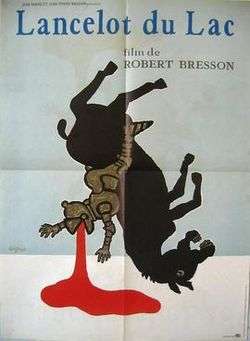Lancelot du Lac (film)
Lancelot du Lac is a 1974 French fantasy drama film written and directed by Robert Bresson.[1] It retells the story of Lancelot and Guinevere's love as Camelot and the Round Table fall apart. It is based on Arthurian legend and medieval romances, especially the Lancelot-Grail cycle, and the works of Chrétien de Troyes.
| Lancelot du Lac | |
|---|---|
 Theatrical film poster | |
| Directed by | Robert Bresson |
| Produced by | Jean-Pierre Rassam Francois Rochas |
| Written by | Robert Bresson |
| Starring | Luc Simon Laura Duke Condominas Humbert Balsan Vladimir Antolek-Oresek Patrick Bernhard |
| Music by | Philippe Sarde |
| Cinematography | Pasqualino De Santis |
| Edited by | Germaine Artus |
Production company | |
| Distributed by | Gaumont |
Release date | May 1974 (Cannes) 26 September 1974 (France) |
Running time | 85 minutes |
| Country | France |
| Language | French |
In common with Bresson's later films, the cast was composed of amateur actors, several of whom did not appear in any other film. Bresson's direction demanded a purposeful lack of emotion in the acting style, and reduced or eliminated the fantastical elements of the Grail legend. While much of the production is intentionally stylised as Medieval "Romance", the film is punctuated with moments of graphic violence.
Plot summary
King Arthur has sent out 100 knights to retrieve the Holy Grail. Arthur is dismayed when it turns out that the mission was futile and 70 knights have died in its course. Among those who have returned is Lancelot, the lover of Queen Guinevere. Soon Lancelot again takes part in a tournament. There he gets injured. While Lancelot seeks recovery in his own castle, Arthur learns about his wife's affair and, heavily agitated by Mordred, he puts Queen Guinevere in prison. With Lancelot's help she breaks out. Arthur starts immediately a campaign against the castle where the lovers were looking for shelter. During the siege Lancelot happens to kill his old mate Gawain. Driven by sorrow he tries to end the fight and wants to negotiate a treaty with King Arthur. When he witnesses how Mordred commits an attempt on Arthur he joins without hesitating the side of the king. In the final scene, many knights, among whom Arthur, lie dead or wounded after the battle. Lancelot, wounded himself, utters Guinevere's name before falling over.
Selected cast
- Luc Simon as Lancelot du Lac
- Laura Duke Condominas as Queen Guinevere
- Humbert Balsan as Gauvain (Gawain)
- Vladimir Antolek-Oresek as King Arthur
- Patrick Bernhard as Mordred
- Arthur De Montalembert as Lionel
- Charles Balsan
- Christian Schlumberger
- Joseph-Patrick Le Quidre
- Jean-Paul Leperlier
- Marie-Louise Buffet
- Marie-Gabrielle Cartron
- Antoine Rabaud
- Jean-Marie Becar
- Guy de Bernis
Production
The film was shot from the end of June to the start of September 1973 in Noirmoutier-en-l'Île.[2] It was shot on 35 mm color film with an aspect ratio of 1.66 : 1.[3]
Release
The film premiered at the 1974 Cannes Film Festival in May 1974, followed by its theatrical release in France on 26 September 1974. It had its television premiere in West Germany on 4 May 1974.[4]
Reception
Critical response
The film was well-received among critics, currently holding a 95% "fresh" rating on Rotten Tomatoes based on 16 reviews.[5]
It was Michael Haneke's second-place choice in the 2002 Sight & Sound poll of the greatest films ever made.[6]
Accolades
The film won the FIPRESCI Prize at the 1974 Cannes Film Festival.[7]
See also
- List of films based on Arthurian legend
References
- "Lancelot of the Lake". unifrance.org. Retrieved 2014-03-03.
- http://www.filmzentrale.com/rezis2/lancelotritterderkoeniginss.htm
- https://www.imdb.com/title/tt0071737/technical?ref_=ttfc_sa_6
- https://www.imdb.com/title/tt0071737/releaseinfo?ref_=ttfc_sa_1
- http://www.rottentomatoes.com/m/lancelot_of_the_lake/
- "How the directors and critics voted: Michael Haneke". British Film Institute. Archived from the original on June 26, 2012. Retrieved May 17, 2017.
- "Festival de Cannes: Lancelot du Lac". festival-cannes.com. Retrieved 2009-04-27.